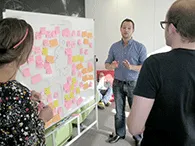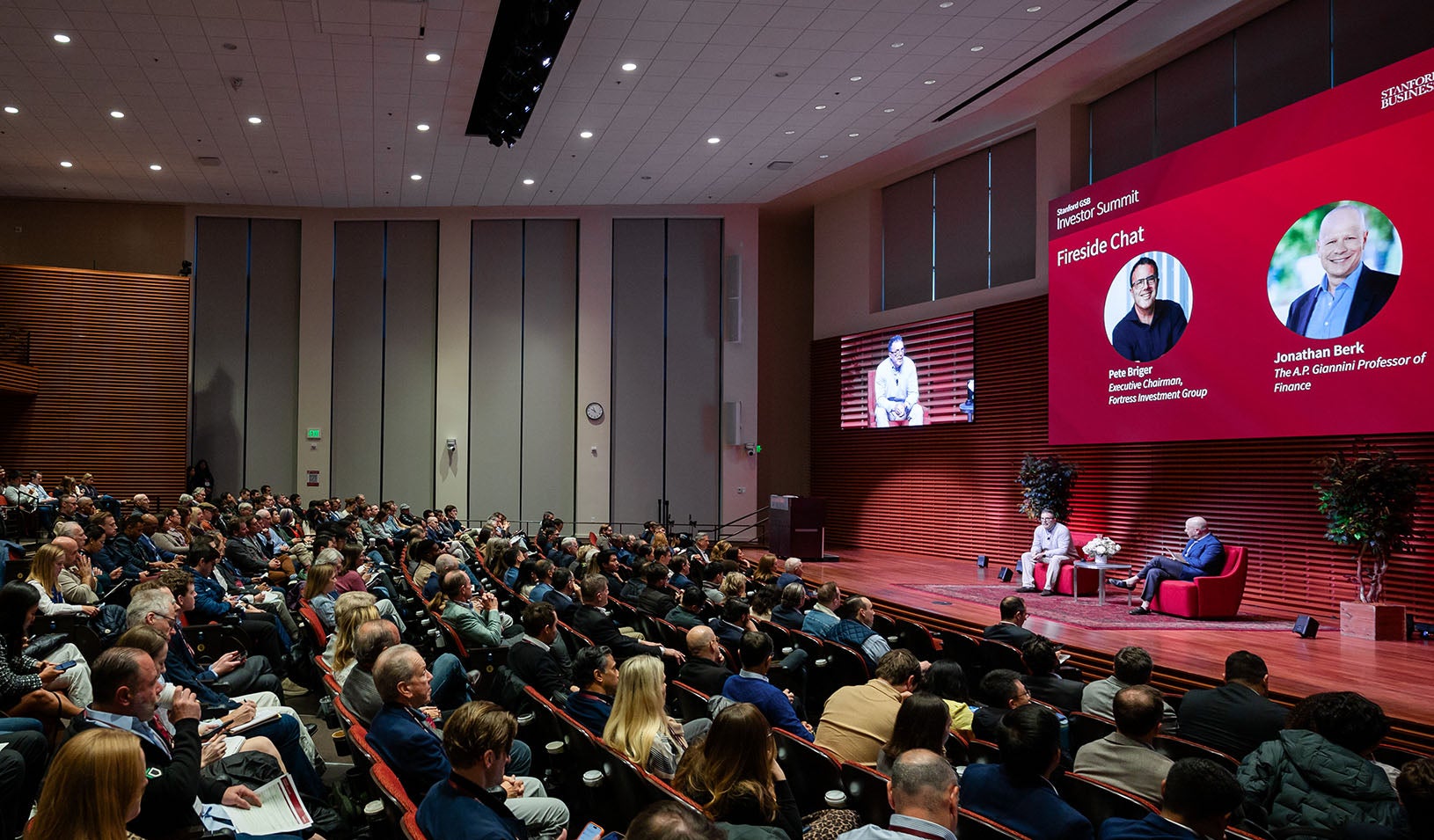November 08, 2013

Franck Langevin introduced design thinking in his organization after completing the Stanford Innovation and Entrepreneurship certificate program.
When French product manager Franck Langevin completed the online Stanford Innovation and Entrepreneurship Certificate last month, he did not simply internalize the eight required courses. He also synthesized the learning and shared it with colleagues at his company, Mappy, a 100-person software company in Paris akin to Google Maps. “I’ve introduced design thinking in my organization,” said Langevin. “This is the fruit of the courses: People like this fresh way of improving product design. We are following the interviewing and prototyping methods laid out in the program.”
Langevin is just the first of several graduates who recently completed the Stanford online certificate. Available to anyone anywhere in the world at any time, the online Stanford Innovation and Entrepreneurship Certificate, which launched in Fall 2012, added its eighth course in September, allowing the earliest participants to complete their certificate in the last month. People may enroll in a single course or earn the professional certificate from Stanford by completing any 8 of 12 courses. Since the program’s inception, some 270 individuals have enrolled in at least one of the courses, for which tuition is $995 each. Participants in the program represent 47 countries, with 46% from outside the United States. The largest numbers of participants are from the United States, Brazil, Canada, Spain, India, and Australia. Twenty-five percent are women.
Among the eight courses Langevin took, the ones he remembers as most valuable are Leading Innovation, taught by Professor Robert Sutton, which focuses on how to build a culture of innovation within an organization, and Empathize and Prototype: A Hands-On Dive into the Key Tools of Design Thinking, which teaches participants how to develop a deep understanding of product users.
Langevin cites the Leading Innovation course as a source of his motivation to lead “Make It Day” at Mappy. This event encourages collaborative idea generation and innovation brainstorming within a 24-hour period. Employees of the company are encouraged to set aside daily tasks and prototype an approach to a problem within the business — anything from a better way to handle invoices to a new product enhancement. Langevin says this event has been embraced by employees as a way to uncover creative solutions within the company, and that they are organizing a second Make It Day this year. “I learned from Professor Sutton’s course that you can’t force people to innovate. You need to create a safe environment where they feel trusted, respected, and empowered.”
Recently, Langevin’s company has initiated a strategic shift from online mapping and e-commerce to developing incentives for mobile users to go to physical stores to buy products and services. This involves understanding in detail what motivates the consumer, and how he or she shops in order to develop a product that accurately matches the consumer with appropriate new services. Langevin spoke about how the courses in the Stanford Innovation and Entrepreneurship Certificate have influenced the way he and his team have approached users. “We set out to conduct empathy interviews with users to discover what the real need is, and what we found was a huge learning about how much a comfort zone and temporal factors influence their consumer behavior,” he said. “It’s a tango between creating the product and developing the market,” said Langevin. “I am spending more time doing user research to be sure I am addressing the right need that might lead to a better product.”

In addition to design thinking and leading innovation classes, other online certificate courses include:
- Financing Innovation: Valuing Projects and Firms
- The Power of Stories to Fuel Innovation
- Building Business Models
- Scaling Excellence Through Innovation
- Marketing Innovation
- Creating Demand: Driving Growth Using Traditional, Social, and Viral Marketing
Professionals around the world are able to access Stanford faculty content and Silicon Valley experts as they learn essential skills and effective strategies for working in and managing innovative organizations. An engaging digital experience has been developed by the Stanford Center for Professional Development at the School of Engineering and Stanford Graduate School of Business to deliver the course content.
Additional courses will continue to be introduced throughout 2013, including:
- Negotiation: How to Get (More of) What You Want
- Cultivating the Entrepreneurial Mindset
- Strategy for Innovation
- Innovating Through Value Chains
Courses are taught by Stanford faculty, drawing on instructors from Stanford Graduate School of Business and Stanford School of Engineering, including its Stanford Hasso Plattner Institute of Design, known as the d.school, as well as Silicon Valley industry leaders, using highly interactive and occasionally unconventional methods. The online certificate program is led by faculty directors Robert Sutton, professor of management science and engineering at the School of Engineering, and Hayagreeva Rao, professor of organizational behavior and human resources at Stanford Graduate School of Business.
Entrepreneurs and aspiring entrepreneurs, as well as professionals from startups, Fortune 500 companies, nonprofit teams, and the public sector, will find the program to be practical and impactful. Given the level of material, participants must be fluent in written and spoken English. Participants will develop the skills to become catalysts for change as they learn how to foster innovation throughout their organizations. Whether it is someone’s first class in innovation or a chance to cultivate a deeper understanding and practice of innovation, participants learn how to use innovative thinking for personal and professional success.
By Barbara Buell
For media inquiries, visit the Newsroom.



